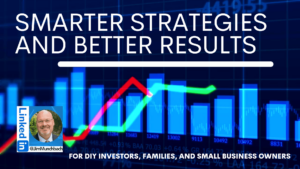Bull Bear Strategy for Managing Risk
Hi, I’m Jim Munchbach. I created the following 15 minute video to introduce you to a new investment strategy: The BayRock Bull Bear Portfolio.
It’s designed to do what all good and effective investment strategies are designed to do…
Maximize Returns
Minimize Risk
The following content is for illustrative and educational purposes. Before you spend any time considering if the BayRock Bull Bear Portfolio Strategy is for you, I strongly encourage you to Get Your Risk Number. Taking our 5 Minute Risk Survey is the first step in learning how much risk you want, how much risk you have, and how much risk you need to meet your most important goals.
What’s Your Risk Number?
If you don’t know, please CLICK HERE TO TAKE OUR 5 MINUTE RISK SURVEY.

For the record, I’m a Certified Financial Planner™ practitioner and CEO of BayRock. I’m an Independent Fiduciary Investment Advisor and I’m making this video to announce some big changes I’ve made in my own investment portfolio.
BayRock Bull Bear Strategy DISCLAIMER:
The following reports and images should not be relied on as a substitute for official account statements.
All content on this page is for illustrative/educational purposes only. None of the strategies outlined here are available without first completing the BayRock Risk Survey – click here to do so now. Additionally, investors are required to meet with a BayRock Fiduciary prior to engaging with BayRock Financial. To book your free consultation with a BayRock Certified Financial Planner™ Practioner now – Click Here.
The performance data quoted represents past performance. Past performance does not guarantee future results. Investment return and principal value will fluctuate so that an investor’s shares, when redeemed, may be worth more or less than their original cost. Current performance may be lower or higher than the performance information quoted. The performance quoted reflects the reinvestment of dividends and capital gains and is net of expenses.
Investors should consider the investment objectives, risks, charges and expenses of the investment company carefully before investing. The prospectus and, if available, the summary prospectus contain this and other important information about the investment company. Request a prospectus from the offering institution or your financial representative. Read carefully before investing.
Past performance may not be indicative of future results. Different types of investments involve varying degrees of risk. Future performance of any specific investments (including the investments provided by Jim Munchbach, Certified Financial Planner™, BayRock Financial, and/or Charles Schwab our primary Custodian) involve risk. RiskAlyze is a powerful tool to help take the guesswork out of your investment program. Please email [email protected] with questions.
IMPORTANT: The projections or other information generated by Riskalyze regarding the likelihood of various investment outcomes are hypothetical in nature, do not reflect actual investment results and are not guarantees of future results. These figures may exclude commissions, sales charges or advisory fees which, if included, would have had a negative effect on the annual returns. In instances where a security is unrecognized by the Riskalyze system or a security does not yet contain more than six (6) months of historical return data, Riskalyze may assign a benchmark/proxy to more accurately display risk and return analytics. In these instances Riskalyze will use the historical data associated with the benchmark/proxy indicated. Please see additional disclosures (included towards the end of this report) for any exchange traded funds and/or mutual funds referenced in any of the following reports.
Why I Started BayRock
When I started BayRock, I thought it made sense to manage clients’ investments the same way I manage my investments.

Over the last few years, we’ve been in a nice Bull Market. In 2020, we had a nasty Bear Market that lasted about 5 minutes and then we quickly shot up to all time highs. In 2021 the S&P 500 jumped to a fresh new highs 68 times. That is a Bull Market.
Unlike Houston, Texas “The Market” has four different seasons.
Bull Market = Uptrend
Bear Market = Downtrend
Consolidation = Sideways
Uncertainty = Volatility
Tis the Season of Uncertainty
Volatility creates big swings in the market in both directions; when the stock market rises and falls more than one percent over a sustained period of time, we call that a “volatile” market. Lately we’ve had a couple of times when the market rose and fell more than one percent in a single day.
Investor Training
BayRock Clients
My first and most important priority is to BayRock clients. As your Fidcuciary Investment Advisor, its important to me that you understand the risk related to any investment I recommend. The Bull Bear Strategy involves a few elements that are different and unique so I’ll be providing additional training to help you decide if this strategy is for you.
DIY Investors
Over the years I’ve had the privelege of helping a number of DIY investors; this training is available for all of the DIY investors I already know. If you don’t already know me, you’re welcome, too. Just enroll in our free online course: Make Your Money Count
LinkedIn Learn
BayRock is hiring and I’ll be posting my training videos to LinkedIn where I have over 10,000 connections. Most of my LInkedIn connections are Financial Advisors and Certified Financial Planner™ professionals. Before interviewing for a financial planning or a portfolio manager position at BayRock, I’m going to encourage any prospective candidates to complete the online training.
The Bull Bear Strategy is relatively simple to run but it is a lot of work. It takes time, focus, and a certain level of skills training to make it work. While I like my job, I don’t particularly love looking at charts everyday and for that reason, I’m eager to hire my replacement in the portfolio management department.
The Market
What’s in Your Portfolio!?
SPY = S&P 500, a Proxy for The Market
DIA = The Dow Industrial, top 30
QQQ = NASDAQ, technology, growth
Asset Allocation & Sectors
IWM = Small Cap
MDY = Mid Cap
SMH = Chip Makers (Semi Conductors)
ARKK = Innovation
XBI = Biotechnology
TLT = Bond Proxy
EFA = International and Emerging Markets
Trends and Charts
The Trend is Your Friend – Until the End!
6 Month Daily Chart
Support and Resistance
Simple Moving Averages
8 Days
50 Days
200 Days
Bull Bear Strategy
Bullish Trend = Long the Market
Sideways Trend = Half Cash
Bearish Trend = Short the Market
Risk Analysis
BayRock Bull = Long
BayRock Half Cash = 50% Cash
BayRock Bear = Short
Inverse ETF List
ETF Pros and Cons
Leveraged ETF = Risk!
Inverse ETF = Double Risk!
Call to Action
BayRock Clients
Email Yes, I like the Bull Bear Strategy
Email NO, I want to stick with my Old Strategy
Book a One-On-One Zoom Meeting
DIY Investors

Prospective Team Members
Click the link below any of the following report titles to instantly download the complete RiskAlyze Report:

BayRock 40 compared to First Trust portfolio with a 24 Risk Number
Click Here to Download this RiskAlyze Report


BayRock 50 compared to First Trust portfolio with a 24 Risk Number
Click Here to Download this RiskAlyze Report


BayRock 60 compared to First Trust portfolio with a 24 Risk Number
Click Here to Download this RiskAlyze Report


BayRock 70 compared to First Trust portfolio with a 24 Risk Number
Click Here to Download this RiskAlyze Report

BayRock 80 compared to First Trust portfolio with a 24 Risk Number
Click Here to Download this RiskAlyze Report


BayRock Bull vs BayRock Half Cash (the same portfolio model as BayRock Bull with Half Cash)
Click Here to Download this RiskAlyze Report



BayRock Bull vs BayRock Bear (the same portfolio model as BayRock Bull with Leveraged and Inverse ETFs and Half Cash)
Click Here to Download this RiskAlyze Report



BayRock Half Cash vs BayRock Bear (the same portfolio model as BayRock Half Cash with Leveraged and Inverse ETFs and Half Cash)
Click Here to Download this RiskAlyze Report



First Trust 24 compared to BayRock Half Cash
Click Here to Download this RiskAlyze Report



About RiskAlyze Reports
The Asset Allocation Heatmap expresses the weighted potential upside and downside that each allocation contributes to the overall portfolio, along with the portion of each allocation’s potential downside that has been diversified away due to correlation.
The percentages shown represent a given allocation’s potential performance, contextualized to its weight within the overall portfolio. The green percentage represents an allocation’s portfolio-weighted potential upside, while the red percentage represents its total portfolio-weighted potential downside. The gold percentage represents the portion of that total portfolio-weighted potential downside that has been diversified away due to correlation.
The Risk/Reward Heatmap visually expresses the probable risk (red bar), probable return (green bar) and the amount of risk that is likely (probable) to be diversified out by inverse correlations (gold bar) given the data model selected.
The green bar visually expresses the amount of probable return each investment contributes to the portfolio; dollar amount weighted. The red bar visually expresses the amount of probable downside risk each investment contributes to the portfolio; dollar amount weighted. The gold bar visually expresses the amount of probable downside risk which is likely offset by diversification effects generated by other investments in the portfolio. The Risk Reward Heatmap is a visual representation of the investment analysis which includes historical return, volatility and correlation statistics calculated using a long-term average of +0% for the S&P 500, 0bps change in the Ten Year US Treasury Rate, and correlation and volatility data from 2008 to present. The Six Month 95% Historical Range is calculated from the standard deviation of the portfolio (via covariance matrix), and represents a hypothetical statistical probability, but there is no guarantee any investments would perform within the range. There is a 5% probability of greater losses. The underlying data is updated as of the previous day’s market close price, and the results may vary with each use and over time. The investments considered were determined by Jim Munchbach, CFP®, CLU®, ChFC®, CPCU® on May 4, 2022 for illustrative and educational purposes only.
Educational
These calculations are designed to be informational and educational only and do not constitute investment advice. Investors should review their investment strategy periodically as financial circumstances change. The stress tests provided are a rough approximation of future financial performance should markets experience conditions similar to those shown. It is highly unlikely that such historical events will repeat themselves. The results presented by this stress test are hypothetical and may not reflect the actual growth of actual investments. Riskalyze and its affiliates are not responsible for the consequences of any decisions or actions taken in reliance upon or as a result of the information provided.
IMPORTANT: The projections or other information generated by Riskalyze regarding the likelihood of various investment outcomes are hypothetical in nature, do not reflect actual investment results and are not guarantees of future results. These figures may exclude commissions, sales charges or advisory fees which, if included, would have had a negative effect on the annual returns.
NOTE: These calculations do not report what happened to this portfolio during the noted market environment. The “this portfolio’s estimated performance” uses actual volatility and correlation statistics from Jan 1 2008 through present in conjunction with the noted rate of return (or loss) for the index shown to present an estimated performance should another environment like those presented occur again. For example, the “2013-Like Bull Market” scenario uses the portfolio’s actual volatility (as measured by standard deviation) and correlation statistics (using a correlation matrix) from January 1st 2008 through present while assuming the same return realized by the S & P 500 index in 2013 of 32%. Because the portfolios you are comparing have different dollar values, we’ve normalized the stress tests presented here to match the value of the compared portfolio.


